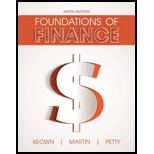
Foundations of Finance (9th Edition) (Pearson Series in Finance)
9th Edition
ISBN: 9780134083285
Author: Arthur J. Keown, John D. Martin, J. William Petty
Publisher: PEARSON
expand_more
expand_more
format_list_bulleted
Question
Chapter 1, Problem 2RQ
Summary Introduction
To discuss: The reasons on whether projects oppose the goal of maximization of shareholder wealth.
Expert Solution & Answer
Want to see the full answer?
Check out a sample textbook solution
Students have asked these similar questions
Need asst.
Sopve this fin
Ineed soln
Chapter 1 Solutions
Foundations of Finance (9th Edition) (Pearson Series in Finance)
Knowledge Booster
Similar questions
- Consider an asset S with price function S = 2+2t S(t) = S=8-t for tЄ [0,2], for tЄ [2,4], St² 8t+20 for tЄ [4,6]. (a) Sketch the graph of S(t). - (b) Calculate the continuous arithmetic average of S over the interval 0 ≤ t ≤ 6. (c) Calculate the discrete arithmetic and discrete geometric average of S, where the discrete sampling points are take at times t = t; = ist for i = 0, 1, 2,...6 with St = 1. (d) What is the payoff of a European-style discrete geometric average rate call option which expires at t = T = 6 with E = 4.2? (e) What is the payoff of a European-style continuous arithmetic average strike put which expires at t = T = 6? (f) Consider a stop-loss option with λ = 5/6. At what time will this option be exercised? What will be the payoff?arrow_forwardFor UK Vodaphone,1(a)collect data from uk Vodaphone data annual report and Input data to all tables and each box individually with bellow law. Explain with 4 points: (a) explain the ratios (b)comment on the number in the table above. (c) Explain the reason why. (d)What do you think?). Within 1600 word Law: FIM Part I PDF Generative summary Gross margin Net margin Current ratio Cash AŞİR Debt equity ratio Debt capital ratio to to Asset turnover **Al Assistant I 20 Comment Highlight Underline Strikethr... Draw More to... 2020 2021 2022 2023 2024 2020 2021 2022 2023 2024 2020 2021 2022 2023 2024 Fixed asset turnover 1. (b) A critical assessment of the firm's working capital management over the same period. Again, you are advised to include graphical illustrate to support your answer. within 600 word 2020 2021 2022 2023 2024 Inventory days Inventory turnover Sales Profit Dixiend 2020 2021 2022 2023 2024 2020 2021 2022 2023 2024arrow_forwardSolve it no ai.arrow_forward
arrow_back_ios
SEE MORE QUESTIONS
arrow_forward_ios
Recommended textbooks for you
- Business/Professional Ethics Directors/Executives...AccountingISBN:9781337485913Author:BROOKSPublisher:Cengage
 Intermediate Financial Management (MindTap Course...FinanceISBN:9781337395083Author:Eugene F. Brigham, Phillip R. DavesPublisher:Cengage Learning
Intermediate Financial Management (MindTap Course...FinanceISBN:9781337395083Author:Eugene F. Brigham, Phillip R. DavesPublisher:Cengage Learning EBK CONTEMPORARY FINANCIAL MANAGEMENTFinanceISBN:9781337514835Author:MOYERPublisher:CENGAGE LEARNING - CONSIGNMENT
EBK CONTEMPORARY FINANCIAL MANAGEMENTFinanceISBN:9781337514835Author:MOYERPublisher:CENGAGE LEARNING - CONSIGNMENT

Business/Professional Ethics Directors/Executives...
Accounting
ISBN:9781337485913
Author:BROOKS
Publisher:Cengage

Intermediate Financial Management (MindTap Course...
Finance
ISBN:9781337395083
Author:Eugene F. Brigham, Phillip R. Daves
Publisher:Cengage Learning

EBK CONTEMPORARY FINANCIAL MANAGEMENT
Finance
ISBN:9781337514835
Author:MOYER
Publisher:CENGAGE LEARNING - CONSIGNMENT